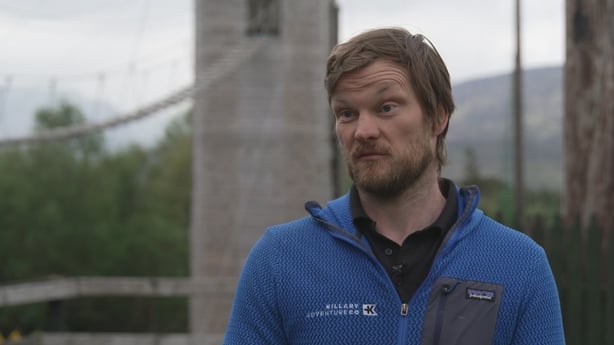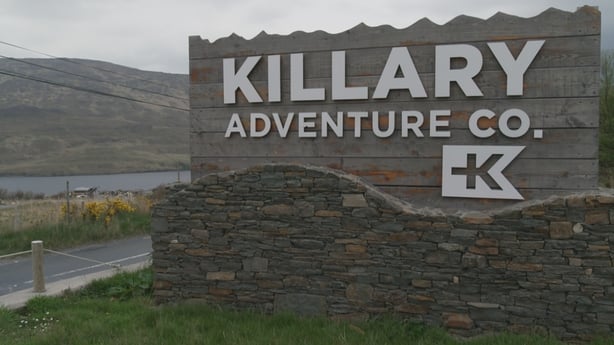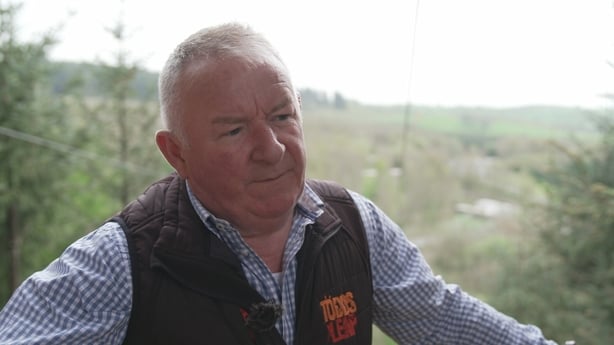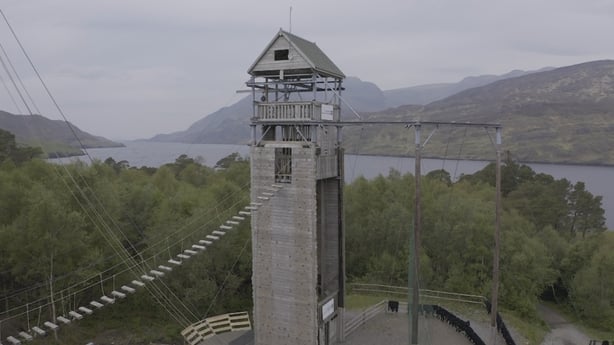There are few areas in Ireland more beautiful than Killary Harbour. It's one of only three glacial fjords in the country, the Mayo peaks of Mweelrea and Ben Gorm looming over its northern shore, Galway’s Maumturks to the south.
Its rugged landscape provides a microcosm of Ireland’s wild outdoors. Hiking, rock-climbing, sailing, kayaking are all within hand’s reach. It’s no great surprise that this is where Jamie and Mary Young chose to base themselves when they established Killary Adventure in 1981, identifying a burgeoning demand for adventure tourism in Ireland.
Forty years later, their son Shane is running the business, which is now one of the biggest adventure centres in the country, a major employer and tourist draw to the area. These days, adventure tourism has become an industry in itself. It features heavily in the material used to market Ireland abroad as a holiday destination.

In many ways, Killary has stayed ahead of the game - it’s maintained a strong focus on the environment and sustainability. With its wind turbine, solar panels and grass-roofed buildings, it is in many ways a model for what the future of Irish tourism could be.
These are challenging times for tourism, with specific challenges facing businesses like Killary. The cost of insuring the kind of activities provided by Killary has rocketed in recent years. Some activities have been curtailed because companies will no longer provide cover.
We arrive at Killary as Shane and the rest of the team (including his mother Mary) are taking a course to refresh their first-aid qualifications. Shane is also chairman of the Irish Association of Adventure Tourism and safety is paramount for all its members.
Nevertheless, the group says that its public liability insurance premiums for its members are four and a half times the cost in the UK and six to eight times the cost of their counterparts in Germany.
It’s no different for Killary. Shane says that as recently as 2016, the centre was paying around €40,000 a year for cover, that’s now risen to over €100,000. The business hasn’t grown hugely in that time, nor has it had a rise in claims. Shane’s frustration stems from the fact that insurance costs are now 8-9% of his turnover, whereas similar centres in Italy are spending only 1% of theirs.

Killary can no longer get cover for activities such as wake-boarding or ringo-riding (where participants are towed behind a speedboat either on a board or in an inflatable ring), despite never having an accident. Their boat house is now full of equipment that can’t be used, with two RIB speed boats worth several hundred thousand euro lying idle outside it. The watersport equipment can’t be sold, because no other company in Ireland will get insurance cover either.
"If you want to go to Spain or Germany or probably even Northern Ireland, off you go. You can do these activities, no problem at all. But Ireland has just been deemed too risky, which to me is crazy, because if you can do it in every other European country, why can't you do it in Ireland?" Shane asks.
The Northern Ireland example is a strong one. Todd’s Leap in Co. Tyrone is also a family-run business, operating for decades. One of their main attractions is a sheer drop from a 30-foot high platform onto a giant inflatable pad. For anybody seeking that kind of thrill, there’s no point looking south of the border. After looking into it for Killary, Shane was given a flat 'no’ by his insurance provider.
Ben O’Hanlon, the owner of Todd’s Leap, says they offer 25 activities, with between 60,000 and 100,000 people coming through the doors each year. There is a broad spectrum of risk across the activities and his insurance costs are also significant, though not in the same league as Killary’s, despite his insurance covering activities that Killary’s insurance won’t. "I think we're lucky as a business because we've been operating so long, 32 years. We have what the insurance industry terms a very good claims history. Now, there is a massive cost in running the safety element to prevent that."
When asked if he could run his business as it is currently south of the border, he replies "Probably not. There’s four or five activities we simply couldn’t get cover for".

Minister of State at the Department of Finance, Jennifer Carroll MacNeill, acknowledged problems with the high cost of public liability insurance, but pointed to new legislation that is currently being scrutinised at the Seanad.
"The legislation that's going through the House now will shift the balance away from the person providing the service - the bike hire, the Ringo on the water- taking all the responsibility".
It will "properly" balance it "between the person using the service and the person providing it," the Fine Gael TD, whose responsibilities include the insurance sector, told Prime Time.
Referring to the Courts and Civil Law (Miscellaneous Provisions) Bill 2022, she said that once it becomes law, Ireland will become much more "in line with what we see in the UK, what we see across Europe, and stop us being an outlier."
"That really will have an effect on ability to get insurance, good insurance at a normal price. And that's what I'm determined to deliver," she said.
She also promised that once the law passes she will be contacting the insurance industry to make sure they do cut the prices of public liability insurance.
"When that legislation goes through during the summer, I will be picking up the phone and inviting the CEOs in here to have that very direct conversation with them. Again, the legislation, will be passed then, there's literally no excuse after that," she said.
It’s not just high octane adventure that’s suffering currently. Ireland’s greenway network has proven immensely popular over the past decade or so. Travis Zeray runs Clew Bay Bike Hire, the first bike rental company to set up to cater for the Mayo Greenway, 13 years ago. They’ve had no claims in that time, but their insurance premium has increased nearly ten-fold from €3,500 when they started to over €30,000.
For Travis, the spiralling costs could mean difficult decisions. "It's probably more serious than anyone could think. For us, it's about staying afloat, staying in business. I have a few key fellas that work with us and it's very difficult to let them go, and I haven't. And there might come a point where I have to."
There are currently six Greenways in operation, with major projects planned to expand the network.
But tourists who’d like to cycle them may find it difficult to find a bike to rent. Travis frequently receives phone calls from prospective operators who are seeking advice on getting insurance for renting bikes. Many of them can’t even get a quote. "One of my previous staff was looking to set up a bike hire company in Limerick. She couldn't get insurance and you just can't operate without insurance, it's not possible, you just can't do it."
It's just one example of the disconnect between Ireland’s ambitions for active tourism and the reality of what’s possible for adventure businesses at the moment.
Many operators believe that much of the responsibility lies with Ireland’s so-called claims culture.
Shane Young believes claims for what can be trivial injuries have made life a lot more difficult for all businesses in Ireland in a way that it doesn’t in other countries. "If a French child falls and scrapes their knee, we patch them up and forget about. If an Irish child falls and scrapes their knee, you lose three nights sleep waiting for the solicitor’s letter or their parents to get in touch."
Insurance reform was a key commitment in the programme for government.
The 2020 Action Plan for insurance reform contained 66 recommendations, including new guidelines on awards for personal injury. The most recent implementation report stated that the guidelines had resulted in the average damages award roughly halving from just under €22,000 to €11,500. Despite this, those in the adventure tourism sector say it hasn’t had the desired impact.
From Shane Young’s perspective, the situation has only worsened. Our premiums aren't coming down. You have the government and lawyers saying, ‘well, it's not our fault, it's their fault’. You have insurers saying, ‘well, actually, it’s their fault’, or brokers say ‘it's their fault’ and they're all blaming each other. I don’t want to play a blame game. All I'm saying is at the bottom of the pile is us. And we're the ones getting screwed over by everybody"

For some businesses, it could already be too late for any reforms.
Knocknatallon in Co. Monaghan is a quiet village, but the shop and office for Sliabh Beagh Adventures is completely silent. Once upon a time, it was the local grocery shop, run by the grandmother of Fiona Connolly. More recently, Fiona and other family members renovated the derelict building and used it as a base for their new company, offering what they call "very simple outdoor activities" like bike hire and guided hikes. That was two years ago. Now, the bikes are locked away now. The archery targets are wrapped up, nobody is using the children’s playground.
Insuring even these low-level activities was too much for the company to bear. Fiona told Prime Time that last year’s premium was 47% of their turnover. "We had already committed to a massive amount of school tours and bookings, and we didn't want to disappoint. So, we continued until our current year. For year three, the premium increased again, and at that stage it just wasn't feasible. So, we had to make the very difficult decision to suspend our activities. We have looked at different options. There just literally is no market out there."
Sliabh Beagh is exactly the kind of business that should be the bedrock of Ireland’s future tourism; small, local and with deep community roots. For Fiona, their proximity to the border has made it a tougher pill to swallow. "It's very difficult for any business, but the fact that we're literally five kilometres from the border, it's nearly even harder. That's quite difficult to take. When you go to the EU and you can see what they're doing over there and now you're hearing the reports of what their cover is like compared to us, that's difficult to take as well."
The problems that the Irish adventure tourism sector has with insurance are not replicated elsewhere in Europe, Great Britain or even in Northern Ireland. This is an Irish problem. The efforts to find an Irish solution have so far not delivered, meaning that one of Ireland’s most progressive industries may end having to move backwards rather than look forward.






